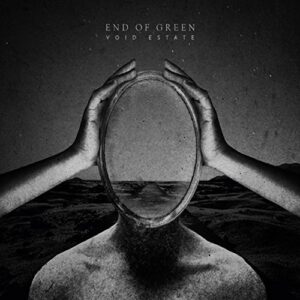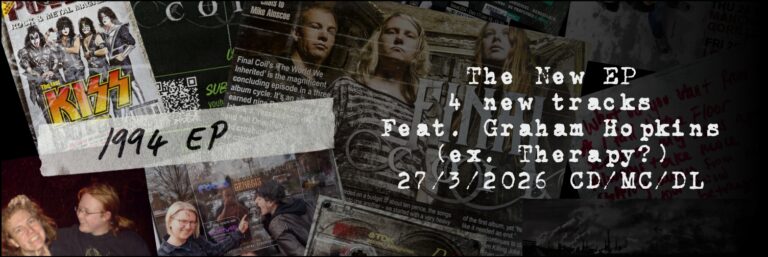
Described as Dark Rock, End of Green hail from Stuttgart where, over the course of the last twenty-five years, they have honed their brooding soundscapes over eight albums. The band’s name symbolises the end of hope, which is symbolised by the colour green, and that downbeat notion pervades the album. With elements of doom, post-rock, country and the sense of haunting, existential dread that permeated Bowie’s ‘Station to station’, End of Green produce “touching and intimate dirges about aging, loss and loneliness”, evoking a bitter-sweet mood of reflection similar to latter-day Anathema releases, albeit with a more desolate edge than that band have injected into more recent offerings. Varied and dynamic, ‘Void estate’ is one of those records to which you’ll return time and again.
The album opens with the remarkably atmospheric ‘send in the clowns’, a sweeping, majestic track that recalls the likes of 40 Watt Sun with its shimmering guitar textures helping to obscure the occasional bursts of metallic rage which emerge on the surface like festering wounds. Melancholic, even beautiful, it provides the album with a haunting prologue before the band plunge into dramatic Paradise Lost territory with ‘Darkside of the sun’, a song built around the chugging riffs and baritone vocals of ‘Draconian Times’, albeit with a subtle Pink Floyd influence that helps to pierce the dark veil of gloom that hangs upon it somewhat. Opting for a lighter tone, musically at least, ‘The door’ offers up elements of latter-day Ulver with its lilting piano and subtle guitar textures used to add depth rather than drive the song. That progressive feel continues into the glorious ‘head down’, a track that sounds like a long lost Johnny Cash collaboration with Nine inch Nails, the rich piano and reverb-drenched guitar transporting the listener to a different world altogether. It’s a beautiful piece of music and an album highlight. A faster-paced track, ‘crossroads’ is a strangely incongruous track with a driving rhythm that dispels the heavy atmosphere that has slowly built up under the earlier numbers, whilst a dusty country influence seeps into the mix. The first half of the record sees the band head back into Paradise Lost territory (via ‘one second’) with ‘the unseen’, a track with a strong gothic vibe that threatens, with its taut beat, to head off into full-blown Sisters of Mercy territory.
The second half of the album opens with ‘Dressed in black again’, another track that edges into 40 Watt Sun territory with acoustic guitar and a melody to die for, but it’s the crushing ‘mellodrome’, an epic eight-minute exploration of dark riffs and shimmering leads, that sits at the blackened core of the album. An anthem for the broken hearted, ‘mellodrome’ is End of Green at their heaviest and it underpins the music with an emotional weight that is bruisingly cathartic. The band return to that late night, Ulver sound with ‘worn and torn’, a song of bitter recrimination that evokes images of haunted, empty streets at four in the morning, the silence broken only by the flood of memory that seems unstoppable at that hour. Similar in town to ‘send in the clowns’, ‘city of broken thoughts’ is redolent of empty glasses left lying on the table and cigarettes stubbed out in overflowing ashtrays, the warmth of the acoustic guitar augmented by rich keyboard textures and, and, once again, a chorus to die for. Throughout, End of Green are able to hint at a subtle heaviness, even when engaged in crafting the most beautiful of soundscapes and the result will haunt your dreams. The album comes to a shattering conclusion with the hazy, melancholic beauty of ‘like a stranger’, a song that draws together the achingly beautiful, post-rock soundscapes of Sigur Ros with a doom sensibility that threatens to overwhelm your defences altogether. Truly beautiful, it sends shivers down the spine and brings a lump to the throat, reminding you once again of just how powerful a force music can be when played from the heart.
Although ostensibly metal, End of Green bring a stately progressive sensibility to proceedings that sees the album traverse a wide, if desolate, landscape in search of new textures and identities. The atmosphere remains dark and pervasive throughout and doom fans will find much to admire in ‘Void Estate’ – it is a work of great depth and power that is best experienced as a coherent whole and whilst its atmosphere threatens to cast a shadow on the sun, the result is cathartic, allowing the listener to emerge strangely uplifted. A work that is full of heart, ‘Void Estate’ is an unexpected highlight amidst this year’s releases. 9/10



